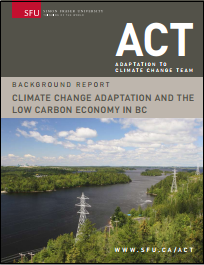Climate Change Adaptation and the Low Carbon Economy in BC


Introduction
This report, which forms the background to the accompanying ACT “Climate Change Adaptation and the Low Carbon Economy in BC Summary Recommendations” report, is intended to encourage dialogue amongst citizens and the Government of British Columbia about three major challenges that must be addressed if we are to leave a sustainable world for our children:
- The ENERGY challenge – our heavy reliance on oil will present significant challenges now that the era of cheap and easy oil has passed;
- The CLIMATE CHANGE challenge – the abundance of heat-trapping greenhouse gas emissions, which we have pumped into the atmosphere, are changing our climate and threatening to destabilize the delicate balance that makes life on Earth possible; and
- The ECOSYSTEM challenge – the majority of the ecosystem services that nature provides are not sustainable. We are currently exceeding the carrying capacity of the Earth and degrading the ecosystems we rely upon for life. We are running a substantial ecological deficit.
(NB: For convenience, we routinely refer to these three challenges collectively as the sustainability challenge throughout this report, with the acknowledgement that sustainability as a concept can include a far more complex set of issues, including social justice).
The preponderance of scientific data overwhelmingly points to significant human influence on climate change. Despite the evidence, there remain some who do not recognize anthropogenic climate change. Regardless of their beliefs on climate change, they should recognize that there is an urgent need to address the broader sustainability challenge for there can be little debate that oil production outside the Organization of Petroleum Exporting Countries (OPEC) has peaked and has started to decline. Moreover, it is clear that many of the ecosystems that support life on earth are facing significant stress. Therefore, we believe that addressing the sustainability challenge makes sense regardless of one’s views on climate change.
The answer to the sustainability challenge is clear: it is imperative that we significantly reduce our ecological footprint and move to a low-carbon economy.
Reducing our ecological footprint does not automatically require a lower quality of life. Other countries around the world, such as the Netherlands, have managed to maintain a standard of living very similar to our own but with significantly smaller ecological footprints. Fear that our quality of life must be sacrificed in order to protect the environment should not stand in the way of action.
Just as the issues of energy security and supply, climate change and protection of our ecosystems are intricately interwoven, so too are the solutions that we must implement. Reducing our ecological footprint is one important way in which we can help to enhance our resilience to the sustainability challenge. In brief—a low-carbon economy and a more resilient energy system together reduce the effect of the energy challenge and the amount of greenhouse gases (GHGs) being pumped into the atmosphere, thereby helping to address both the climate change and ecosystem challenges. In addition, shifting our economy to react to the sustainability challenge will better position BC to compete in the 21st century economy, since all jurisdictions will be forced to find similar solutions.
BC is well positioned to meet the sustainability challenge and provide leadership to the rest of Canada and the world. We have many advantages to assist us in leading the way to maintain and enhance our economically prosperous, high-quality lifestyle while also addressing the sustainability challenge. Among our advantages are not only our geography and abundance of renewable energy sources, but also the many individuals and organizations which have led the way to date in creating relatively progressive public policy.
We conclude our report by presenting policy opportunities for the Government of British Columbia in the area of governance, energy conservation, adaptation and insurance. We believe these policy opportunities will be helpful in addressing what has already become an urgent situation. We recognize that the sustainability challenge will require global responses that are not necessarily discussed in this report, as our focus is on BC in particular. It should also be noted that the policy opportunities are drawn from our own experience, but they reflect many of the ideas that have been put forth by a wide range of individuals and groups including non-governmental organizations, academics, business and government leaders. There is no lack of ideas and policy prescriptions on this subject; however, we sense a complacency that is particularly concerning given the magnitude of the challenge we face.
It is time to step up our actions to address the sustainability challenge.
Citation
Sampson, B., Martens, L., Carr, J., 2010. Climate Change Adaptation and the Low Carbon Economy in BC. Background Report. Available at http://act-adapt.org/low-carbon-economy/
(0) Comments
There is no content